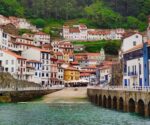Tenerife says no to 400 luxury beach villas after new tourist protest | Travel News | Travel
About fifty Canarian activists demonstrated in front of the Congress of Deputies in Madrid to demand a change in the tourism model in the Canary Islands.
The platform ‘Canarias se Agota’, one of the promoters of the mobilisations planned for April 20, led this protest in front of the Congress with flags of the archipelago and several banners denouncing the “destruction of the territory”.
The mobilisation coincided with the vote on a proposal of law (PNL) of Podemos political party to stop the construction of more than 400 luxury villas on the beach of Puertito de Adeje in Tenerife, known as the project of Cuna del Alma.
This Wednesday, several activists of ‘Canarias se agota’ are scheduled to begin a hunger strike in preparation for the mobilisations on April 20.
The demonstrators demanded the conservation of natural areas, the introduction of an eco-tax, a tourist and holiday moratorium, and the regulation of the purchase of housing by foreigners, among other demands.
The Canary Islands Government imposed a stop order and a €110,000 (£94,208) fine on the project’s promoter for starting construction without obtaining the required environmental impact assessment.
The works began in May 2022 and generated social and political rejection, with two negative reports on the construction made in 2014 and 2017.
On November 11 last year, the Ministry of Ecological Transition ordered the precautionary stoppage of the works due to the “imminent threat of environmental damage”.
A precautionary stop order came in November after they verified the environmental damage the project would have. People had been camping next to the works since the beginning of summer.
The construction company had initially claimed that it was unaware that there were certain protected species in the area.
However, the Government of the Canary Islands verified shortly after that there is a population of plants that must be protected and therefore ordered the work to stop.
Now the plants had been identified, not only by the volunteer scientists who visited the site, but also by the regional Biodiversity Service and the Agency for the Protection of the Natural Environment, but also by the Ministry of Ecological Transition, who said: “Yes there is a formal recognition from the company itself about the presence of this plant and the interference of the works with it.”









